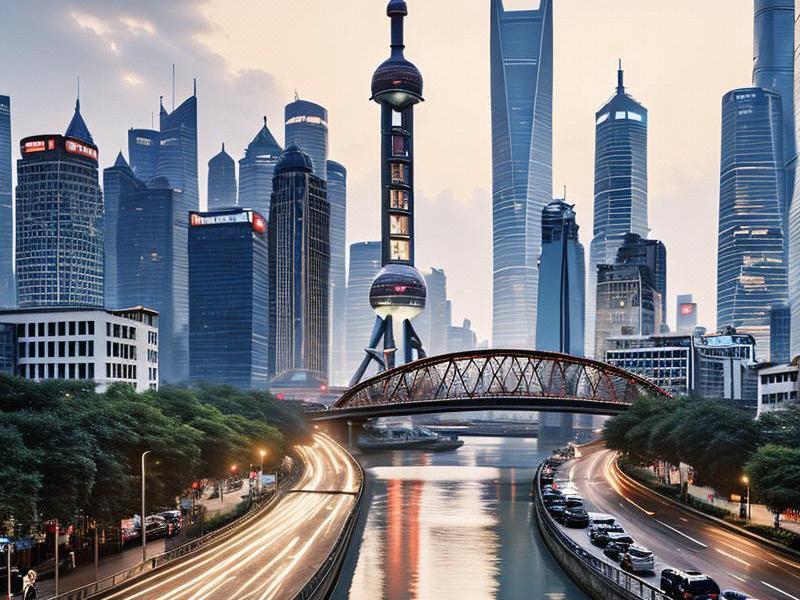
Shanghai, a global financial hub and a symbol of China's modernization, has always been a focal point of attention. With its unique geographical location at the mouth of the Yangtze River and its status as a major port city, Shanghai has played a pivotal role in China's economic development.
The urban development of Shanghai is nothing short of remarkable. Over the years, the city has witnessed rapid expansion and transformation. The iconic skyline, dominated by skyscrapers such as the Shanghai Tower and Jin Mao Tower, stands as a testament to the city's architectural prowess and economic vitality. The Bund, with its historic buildings and stunning views of the Huangpu River, showcases the blend of old and new in Shanghai.
One of the key drivers of Shanghai's urban development has been its commitment to infrastructure investment. The city has developed an extensive network of highways, railways, and subways, facilitating seamless connectivity within the city and with other parts of the country. The recent completion of the Hongqiao Transportation Hub has further enhanced Shanghai's status as a transportation and logistics center.
Economic growth in Shanghai has been equally impressive. As one of China's most important economic engines, the city has attracted a significant amount of foreign investment and domestic capital. Its diverse economy, encompassing finance, manufacturing, trade, and services, has made it a powerhouse of economic activity.
The financial sector is a major pillar of Shanghai's economy. The city is home to the Shanghai Stock Exchange, one of the largest stock exchanges in Asia, and the China (Shanghai) Pilot Free Trade Zone, which has been instrumental in promoting trade liberalization and attracting foreign investment. The presence of multinational corporations and financial institutions has further solidified Shanghai's position as a global financial hub.
爱上海419论坛 Manufacturing remains an important part of Shanghai's economy, with industries such as automotive, electronics, and pharmaceuticals playing a significant role. The city has also made significant strides in the development of high-tech industries, with areas such as Zhangjiang High-Tech Park becoming hubs for innovation and entrepreneurship.
Trade is another area where Shanghai excels. As a major port city, it handles a significant portion of China's foreign trade. The Port of Shanghai is one of the busiest ports in the world, handling millions of containers annually. The city's trade infrastructure, including customs facilities and logistics centers, is highly developed, facilitating efficient trade operations.
In addition to its economic achievements, Shanghai is also known for its rich cultural heritage and vibrant cultural scene. The city has a long history of cultural exchange, having been a center of trade and commerce for centuries. This has resulted in a unique blend of Chinese and Western cultural influences, which is reflected in its architecture, cuisine, and arts.
The Shanghai Museum, with its extensive collection of ancient Chinese art, is a must-visit destination for art enthusiasts. The city's theaters and concert halls host a wide range of performances, from traditional Chinese opera to international music and dance shows. The annual Shanghai International Film Festival is a major event that attracts filmmakers and audiences from around the world.
上海龙凤419油压论坛 Cultural integration is also evident in the city's neighborhoods. Areas such as the French Concession and the former International Settlement showcase the influence of Western architecture and culture. These areas have been preserved and transformed into vibrant cultural and commercial districts, attracting both locals and tourists.
The dynamics between Shanghai and its surrounding areas are also worth exploring. The Yangtze River Delta region, which includes Shanghai, Jiangsu Province, and Zhejiang Province, is one of the most economically developed regions in China. The integration of these regions has been a key focus of government policy, with initiatives aimed at promoting regional cooperation and development.
The development of the Yangtze River Economic Belt has further strengthened the economic ties between Shanghai and its surrounding areas. This initiative aims to promote the development of industries along the Yangtze River, enhance regional connectivity, and protect the environment. Shanghai plays a central role in this initiative, serving as a hub for finance, trade, and logistics.
The integration of Shanghai with its neighboring cities has also been facilitated by the development of high-speed rail networks. The Shanghai-Nanjing High-Speed Railway and the Shanghai-Hangzhou High-Speed Railway have significantly reduced travel times between these cities, promoting regional economic integration and people-to-people exchanges.
上海夜生活论坛 In addition to economic integration, there is also a growing trend of cultural exchange between Shanghai and its surrounding areas. The city's universities and research institutions collaborate with those in other parts of the Yangtze River Delta region, fostering innovation and knowledge sharing. Cultural festivals and events also play a role in promoting mutual understanding and appreciation among the people of the region.
However, the rapid development of Shanghai and its surrounding areas has not been without challenges. Issues such as environmental pollution, traffic congestion, and housing affordability have emerged as concerns that need to be addressed. The government has implemented a range of measures to tackle these issues, including promoting green development, improving public transportation, and increasing the supply of affordable housing.
In conclusion, Shanghai and its surrounding areas represent a dynamic and evolving region that plays a crucial role in China's economic and cultural development. The city's urban development, economic growth, and cultural integration are impressive achievements that have made it a global city. However, addressing the challenges associated with rapid development is essential to ensure sustainable growth and improve the quality of life for its residents.
Looking ahead, the continued integration of Shanghai with its surrounding areas and the Yangtze River Delta region will be key to driving regional development and enhancing China's overall economic competitiveness. With its strong foundation and commitment to innovation and sustainability, Shanghai is well-positioned to continue its journey as a global leader.
